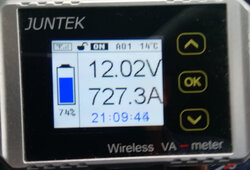I have 5x flooded/lead acid batteries, plugged in parallel (red to red to red & black to black to black).
I've come to learn lead acid/flooded batteries;
. Need to be checked every month to ensure the distilled water is full.
. Can not be brought down more than 50% charge or they'll get damaged.
. Should not be in an environment where they could freeze (like a shed in south Ontario winter, where it can easily get to -20*C or -30*C.
My very first battery, purchased from Canadian Tire, a year ago is a flooded/lead acid battery.
Thus, I followed suit with the other batteries I collected, adding to the battery bank.
I've come to learn lithium are better than flooded.
They can be fully drained and still hold 98% charge.
I have 1x 1 year old battery and 4x 6 month old batteries.
Learning this new information about lithium is tempting me to sell the lead acid batteries and start building the battery bank with lithium.
Thoughts please?
Thank you.
I've come to learn lead acid/flooded batteries;
. Need to be checked every month to ensure the distilled water is full.
. Can not be brought down more than 50% charge or they'll get damaged.
. Should not be in an environment where they could freeze (like a shed in south Ontario winter, where it can easily get to -20*C or -30*C.
My very first battery, purchased from Canadian Tire, a year ago is a flooded/lead acid battery.
Thus, I followed suit with the other batteries I collected, adding to the battery bank.
I've come to learn lithium are better than flooded.
They can be fully drained and still hold 98% charge.
I have 1x 1 year old battery and 4x 6 month old batteries.
Learning this new information about lithium is tempting me to sell the lead acid batteries and start building the battery bank with lithium.
Thoughts please?
Thank you.



